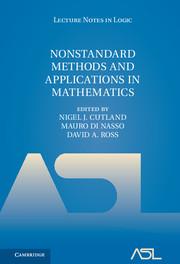Book contents
Preface
Published online by Cambridge University Press: 30 March 2017
Summary
Nonstandard analysis is one of the the great achievements of modern applied mathematical logic. In addition to the important philosophical achievement of providing a sound mathematical basis for using infinitesimals in analysis, the methodology is now well established as a tool for both research and teaching, and has become a fruitful field of investigation in its own right. It has been used to discover and prove significant new standard theorems in such diverse areas as probability theory and stochastic analysis, functional analysis, fluid mechanics, dynamical systems and control theory, and recently there have been some striking and unexpected applications to additive number theory.
A conference on Nonstandard Methods and Applications in Mathematics (NS2002) was held in Pisa, Italy from June 12-16 2002. This was originally planned as a special section in the very successful first joint meeting of the American Mathematical Society and the Unione Matematica Italiana. In order to accommodate the large number of mathematicians interested in the field, a satellite conference, hosted by the Università di Pisa and held at the Domus Galilaeana, was added during the days preceding the main AMS/UMI meeting. A complete list of the registered participants appears later in this forward.
This volume is a by product of NS2002. Not a proceedings per se, it is a collection of peer-reviewed papers solicited from some of the participants with the aim of providing something more timely than a textbook, but less ephemeral than a conventional proceedings. To that end, the volume contains both survey papers on topics for which other surveys are either dated or nonexistent, and research articles on applications too recent to have received attention in older volumes.
One of the included papers, on an infinitesimal approach to calculus, deserves special mention. The use of infinitesimals in the teaching of calculus is of course not at all new, though they began to disappear from textbooks late in the 19th century due to concerns about their theoretical underpinnings.
- Type
- Chapter
- Information
- Nonstandard Methods and Applications in Mathematics , pp. vii - xPublisher: Cambridge University PressPrint publication year: 2006



